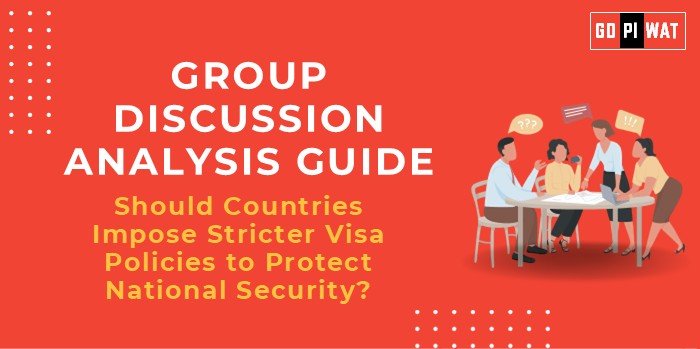📋 Group Discussion Analysis Guide: Should Countries Impose Stricter Visa Policies to Protect National Security?
🌐 Introduction to Stricter Visa Policies
📖 Opening Context
In an interconnected world, visa policies significantly impact global mobility, trade, and security. The debate on whether stricter visa policies enhance national security or hinder globalization remains a pressing concern, especially with rising geopolitical tensions.
📜 Topic Background
Historically, visa regulations have been used as tools for national security, particularly post-9/11, when the USA introduced more stringent checks. Recent incidents, including cyber espionage and terrorism linked to international actors, have reignited this discussion.
📊 Quick Facts and Key Statistics
- 🌍 Global Visa Restrictions Index (2024): Passport power varies; Japan allows visa-free access to 193 destinations, while Afghanistan only 27.
- 💼 Travel and Trade Correlation: Countries with stringent visa policies experience 30% less trade with restrictive counterparts (World Bank, 2023).
- ⚠️ Terrorism Impact: Over 72% of terror attacks globally between 2019-2023 were linked to cross-border operations (Global Terrorism Database).
- 🛂 Immigration Data: The US saw a 20% drop in tourist visas after the 2017 travel ban, affecting a $200 billion tourism industry.
🤝 Stakeholders and Their Roles
- 🏛️ Governments: Enforce regulations and ensure national safety.
- 🛫 International Travelers: Often face hurdles due to tightened policies.
- 🏢 Corporations: Multinational companies impacted by reduced cross-border mobility.
- 📢 Human Rights Organizations: Advocate for less restrictive policies to support refugees and global cooperation.
🏆 Achievements and Challenges
✨ Achievements
- 🔍 Reduced Terror Threat: Stricter screening identified 45% more fraudulent travel documents (Interpol, 2023).
- 💾 Improved Monitoring: Biometric visas implemented by 70+ countries enhance traveler tracking.
- 🤖 Refugee Screening Models: Canada’s AI-driven immigration program expedited 1 million applications in 2023 without security compromise.
⚠️ Challenges
- 💰 Economic Costs: Reduced tourism and business travel hurt global GDP by 0.7% annually.
- ⚖️ Ethical Dilemmas: Stranded refugees highlight human rights concerns.
- 🌐 Global Comparison: Singapore excels with robust yet streamlined visa procedures, while the UK faces criticism for post-Brexit complications.
- 📖 Case Study: The US-Mexico border visa policies showcase challenges in managing security without harming economic ties.
💡 Structured Arguments for Discussion
- 🛠️ Supporting Stance: “Tightened visa controls significantly curb illegal immigration and enhance national security.”
- 🛡️ Opposing Stance: “Over-regulation stifles economic growth, hampers tourism, and damages international relations.”
- ⚖️ Balanced Perspective: “Stricter policies are necessary but must balance security needs with economic and humanitarian considerations.”
🎯 Effective Discussion Approaches
🔑 Opening Approaches
- 📊 Statistical Impact: “72% of global terror attacks involve cross-border actors—highlighting the need for rigorous visa protocols.”
- 📖 Case Study Reference: “The US post-9/11 visa overhaul reduced security breaches but also alienated potential allies.”
⚙️ Counter-Argument Handling
- 🔄 Example: Use comparative data from countries like Canada to emphasize balance in policy design.
🧠 Strategic Analysis: SWOT
SWOT Analysis:
- 💪 Strengths: Enhanced security, fraud prevention, better control over immigration.
- 🛠️ Weaknesses: Economic trade-offs, potential human rights violations.
- 🌟 Opportunities: Improved technologies like AI and biometrics for faster, secure visa processing.
- ⚠️ Threats: Diplomatic backlash, reduced global talent mobility.
🏫 Connecting with B-School Applications
📚 Real-World Applications
- 🌍 Analyze the economic impact of visa restrictions on global markets, supply chains, or case studies for operations management.
🎓 Sample Interview Questions
- ❓ “How can governments balance visa regulations with fostering international collaboration?”
- ❓ “What lessons can India learn from the EU’s visa-free travel policies?”
💡 Insights for B-School Students
- 📈 Explore visa impacts on global HR strategies.
- 🤖 Study public-private partnerships in immigration reforms.
- 💾 Investigate AI’s role in border security.


